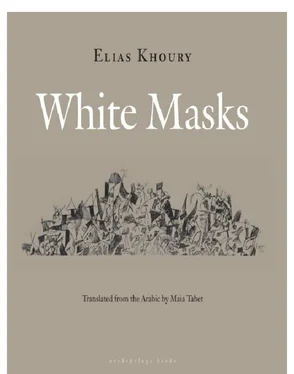So I returned to Beirut and set myself up in this office — and I have never left it since. I’m always combat-ready, but no one ever calls me up anymore; even when Israel invaded the South in 1978, I wasn’t asked to go to the front.
But what I want to know is where the maggots come from. People say they come from inside you, but I think they come from the smell. I remember the feeling to this day — it was as if I’d plunged my hand into a rubber pillow of writhing, wriggling maggots; they crawled up my chest, reached my neck and then my nostrils, and then they exploded into that smell.
It was the same smell, when they brought in Khalil Ahmad Jaber. Why didn’t they wash him — after all, he could’ve been infested too — before they questioned him? That interrogation was such a sham!
And now, here I am, I can’t say anything or go anywhere, I just can’t. They might be able to, but I can’t.
There was this guy. . I don’t know his real name, Issam we called him, that’s what he said his name was when we were in the mountains together. Anyway, I ran into him here in Beirut one day and people were calling him Ibrahim. I wonder what became of him. I saw him on the street once and he walked right past me, as if he’d never laid eyes on me before! As if we’d never been comrades-in-arms and shared those times together!
He was one of those guys who spent the length and breadth of the day talking politics. He was our political cadre, actually, and we used to gather around for hours listening to him tell us about Mao Tse-tung and about Pol Pot, who abolished the cities and liberated the imagination; he would talk to us about the people’s war, about guerrilla warfare, revolution and liberation. I’d never met someone like him before: he was a university lecturer and a fighter! I used to think that all academics were just armchair revolutionaries, you know, bespectacled and potbellied, sitting in their offices, full of hot air and flamboyant gestures. Ibrahim wasn’t like that at all, you should have seen him that time he was injured. He’d been hit in the foot and he didn’t even flinch.
I wasn’t far off and I shouted over to him, “Comrade, you’re wounded!”
“I know,” he said.
“Retreat, I’ll cover you.”
“No, we must get Talal.”
“Talal? Where is he?”
“He’s over there. He was hit in the head, I think he’s dead.”
His voice was steady as a rock even though Talal lay there dead! He suggested we belly-crawl towards the body and drag it back.
“Be careful,” he went on, “the attack’s going to be vicious, but if we don’t retrieve his body now we’ll lose him.”
I tried crawling on my belly but found I didn’t know how to.
“What’s with you?” he asked.
“Nothing.”
“Go on, I’ll cover you.”
“No, you go back and I’ll get Talal. You’re wounded, leave me.”
But he wouldn’t, and we retrieved Talal together — Talal, handsome as a rain-filled cloud in spring, Talal for whom every girl in Arabia would have given her eyes, Talal who now lay beside us, his face drained of life. Issam, at my side and still bleeding profusely, said:
“Don’t cry… we die so that life may go on. Men don’t mourn martyrs.”
That was Ibrahim.
He asked me what I was up to these days.
“Oh, I’m just around,” I told him “and what about you?”
“Me? Nothing much,” he answered. “I’m back at the university, teaching.”
“What about the revolution?”
“Well, what about it. . Everything’s fallen apart. . hasn’t it? It’s finished. It’s all over.”
“Ibrahim, no, how can you say that! What of Talal, then? Have you forgotten?”
“Talal is a martyr. And we suffer.”
We went to his office, and there he started talking religion, telling me about praying and fasting.
“Is that you, Ibrahim, talking like this? Where have all our revolutionary ideas gone?”
He said he thought that a return to religion was the only solution.
“But, but there’s a war out there, Sir, what should we do?” I asked him.
“Nothing. It isn’t our war.”
“Where is our war then?”
“It has yet to start.”
“You mean to say that when this war’s over, you expect us to start fighting all over again?”
“Yeah, you got it! Once this war’s over, then the real war will start.”
“Well, don’t count on me. This war has just about exhausted us. One war is enough, Sir. Please, no more.”
He said I should come and visit him at home and gave me his address. I told him I was much obliged.
“No, really, come over tomorrow evening at seven. We’ll be doing some religious study.”
“You’re really serious?”
“Really, Fahd, come on. It’s over, man, don’t you realize?”
“What is there to realize?”
He just raised a finger skywards and walked away, limping. Remembering his injury, I wanted to ask him about that foot of his, but he was already gone.
So here I am, alone. . and I’ve had it up to the eyeballs with the murder of Khalil Ahmad Jaber! It was just one of those senseless, meaningless incidents: they brought him in for questioning, I saw him, then he left, and then nothing. I don’t know why Abu Jassem — our unit captain, his real name is Sameer Amro — is making such a song and dance about it. We’re sick and tired of his endless investigation, of him making a mountain out of a molehill! I’m sure the boys didn’t do anything to him, it was just a straightforward interrogation and then they let him go. Could it be that they. .? No, they couldn’t have killed him. Then who did it? Could it be…? No, no, it’s not possible. .
As for that Fatimah Fakhro woman, she’s just witless! He had no such thing as a bucket or brush when they brought him in. Why she’s been saying that he trudged around whitewashing walls and tearing down posters, I honestly don’t know! I’m convinced he was just an ordinary guy, a poor soul. . maybe he was a refugee. Perhaps he’d lost all his family and he just liked to wander about, isn’t that what tourists do? Surely, there’s nothing wrong with that!
Who killed him? Some kind of gang, maybe. . Abu Jassem says that’s impossible, that he’s got the place sewn up and no one can move a muscle without his knowledge. And it’s true. He’s been able to track down the people involved in most of the crimes being committed — it was him that uncovered the murder of the Armenian doctor and his wife. At least that’s what he says. And if it’s true, then why can’t he find Khalil Ahmad Jaber’s murderer? In any case, I don’t think it merits this huge fuss, and the interminable talking, and Khalil’s wife coming here constantly for neverending meetings with Abu Jassem.
And why was Fatimah Fakhro dragged in here and threatened? She had nothing to do with this! Her husband divorced the other woman and stole the bracelets — well, maybe he did and maybe he didn’t — and then they killed him. What’s the point of interrogating her, of threatening her and beating her like that? I really don’t understand anymore, why we’re getting sidetracked by all these petty incidents! And, in any case, why shouldn’t people be allowed to whitewash the walls and remove posters if they like? Ya akhi, we human beings are born free, and the walls don’t belong to us!
Personally, I don’t think that he was doing anything suspect around those walls. There’s this engineer, Ali Kalakesh, who came in here all high and mighty, complaining about it in connection with his daughter. What could that poor man do to his daughter? In any case, at the end of the day, it’s none of my business and Khalil Jaber is dead. He’s found his rest, what more could anyone want? Though not before he was tortured. . He was badly beaten up, that’s for sure, but he’s dead and gone, and it’s over! In a country like ours, where such a staggering number of people have died, is the death of Khalil Ahmad Jaber really an issue?
Читать дальше












